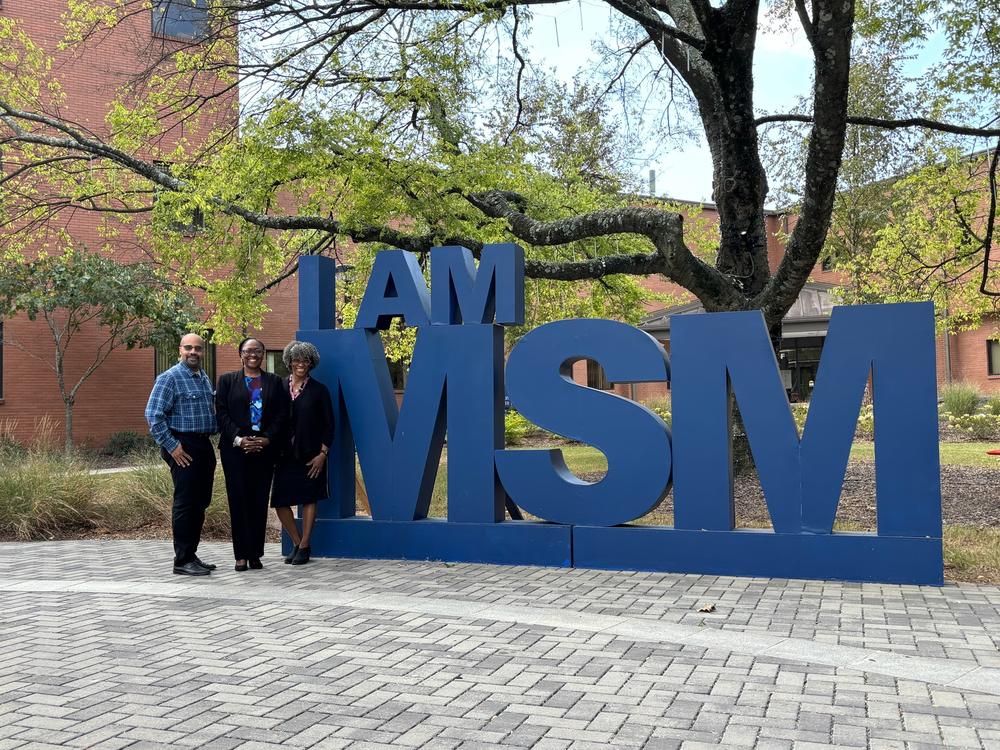
Caption
Christopher Ervin, Maisha Standifer and Folashade Omole stand in front of the I Am MSM sign at Morehouse School of Medicine in Atlanta.
Credit: Ellen Eldridge/GPB News
|Updated: December 1, 2024 10:30 PM

Christopher Ervin, Maisha Standifer and Folashade Omole stand in front of the I Am MSM sign at Morehouse School of Medicine in Atlanta.
Folashade Omole says health care is a topic for any venue: in barbershops, beauty and nail salons, and places where discussion about sexually transmitted diseases may seem inappropriate.
She is the executive director of Morehouse School of Medicine's H.E.A.L. Clinic (Health Equity for All Lives), a student-led initiative to serve people of color and under-served urban populations in Georgia.
Medical students and physicians volunteer at both the Good Samaritan Health Center location and the Morehouse Healthcare clinics located on Howell Mill Road.
“If we demystify HIV, then we'll get more people willing to do the preventive care as well as go, you know, get tested and then treatment,” Omole said.
HIV is a sexually transmitted infection (STI) that can lead to AIDS. Almost half of new HIV infections in the United States are reported in the South, and Atlanta ranks in the top five cities nationally for people living with HIV.
This Sunday, Dec. 1, marks the 37th World AIDS Day. This year's theme? “Collective Action: Sustain and Accelerate HIV Progress.”
Much of the messaging is directed toward men who have sex with men, but Black women account for about 54% of new HIV infections nationally, despite representing less than 15% of the female population — and 91% of these cases occur in heterosexual contact, Maisha Standifer, director of population health at The Satcher Health Leadership Institute (SHLI), said.
“We also have to be very strategic and specific in terms of how we tailor our communications and making sure it's culturally responsive to what's occurring [in that community],” Standifer said.
That includes programs to reduce disease spread among at-risk communities.
Professor at Emory School of Medicine’s Division of Infectious Diseases Dr. Anandi Sheth serves on the Georgia Harm Reduction Coalition board of directors.
The nonprofit was formed in 1995 by community members and researchers who connected rising rates of HIV and hepatitis infections to injection drug use in certain Atlanta area neighborhoods. Volunteers worked in a legal gray area until 2019, when Gov. Brian Kemp signed a law directing the state Department of Public Health to regulate and oversee harm reduction.
Her clinical and research interests focus on the treatment and prevention of HIV among women.
“One of the main things is just making sure that women know that those [treatments] exist, and they're empowered to access them in locations around Atlanta,” Sheth said. “So, basically, sort of having more information and places to access those preventive measures.”
Building trust among communities requires caring enough to listen to the community's needs, Christopher Ervin, the director of community-based initiatives in the Department of Family Medicine at Morehouse, said.
Too often the reason why people are resistant to help is because we don't listen to them or we don't understand them, Ervin said.
"You have to show up," he said. "There's a phrase in public health called 'parachuting,' and what it means is someone gets a little money, they drop in, do a little project, and then they disappear."
/
LISTEN: Christopher Ervin discusses the importance of showing up for the communities they serve.
He visits counties across the state such as Dougherty and Meriwether to host health fairs in under-served communities, such as the LGBTQIA community.
"You're not going to look at Albany, Savannah, Augusta, Macon, Birmingham; you're going to come [to Atlanta] for your care,” Ervin said. “Also, to be reaffirmed about who you are.”
Ryan White Clinics like Beaufort-Jasper-Hampton Comprehensive Health Services serve Pooler’s most at-risk residents by providing medical services at little to no cost to patients — including necessary prescription drugs, primary care and wraparound services through the federal 340B drug pricing program.
Grady Health System provides services for uninsured and underinsured individuals including medication assistance programs to support, reduce or even eliminate costs of using PrEP, Sheth said.
Rep. Sharon Cooper proposed a bill to extend Medicaid to people living with HIV — as opposed to waiting until they have full-blown AIDS.
“In the long run, it is cheaper to help people that are HIV-positive correctly to make sure they have good medical care for other illnesses,” she said, “and that they take their medicines, and, perhaps, can afford the medicines before they have a chance to develop full-blown AIDS, which is astronomically expensive to treat.”
The bill stalled last session, in part, because prevention is expensive, too.
Medications to manage HIV and keep viral loads low can cost thousands of dollars each month.
“I do believe that that is perhaps what behind the scenes was causing a bit of a backlash about it,” she said. “And the people who lobby for it decided it was best for us to pull the bill for the year.”
While Cooper said she may not carry the bill this year, she expects it to return.